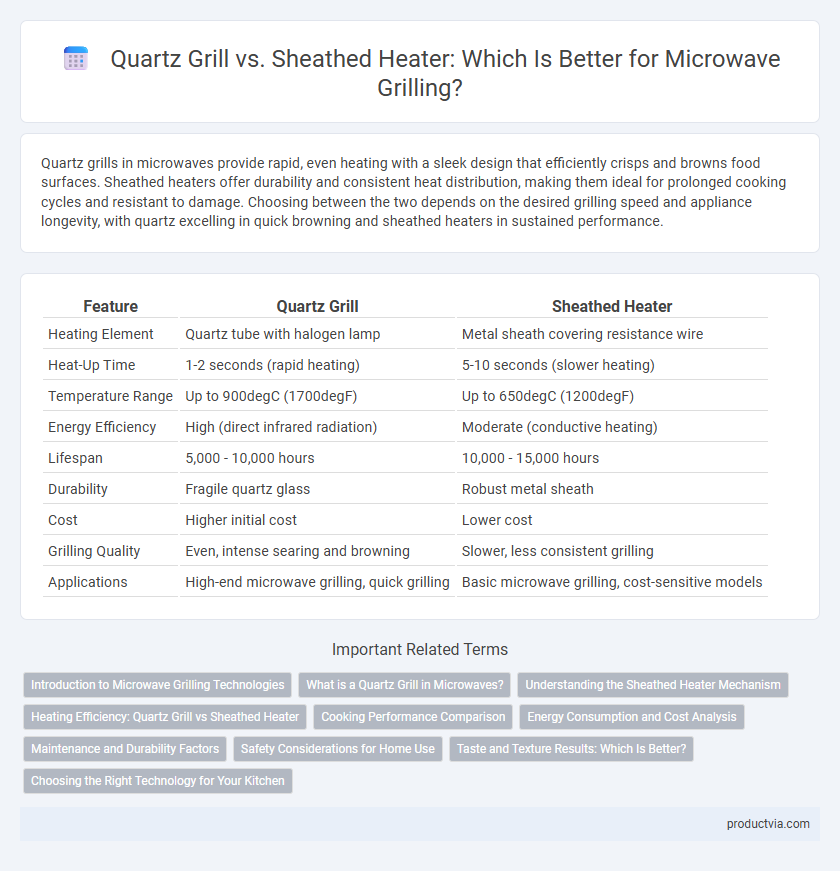Quartz grills in microwaves provide rapid, even heating with a sleek design that efficiently crisps and browns food surfaces. Sheathed heaters offer durability and consistent heat distribution, making them ideal for prolonged cooking cycles and resistant to damage. Choosing between the two depends on the desired grilling speed and appliance longevity, with quartz excelling in quick browning and sheathed heaters in sustained performance.
Table of Comparison
| Feature | Quartz Grill | Sheathed Heater |
|---|---|---|
| Heating Element | Quartz tube with halogen lamp | Metal sheath covering resistance wire |
| Heat-Up Time | 1-2 seconds (rapid heating) | 5-10 seconds (slower heating) |
| Temperature Range | Up to 900degC (1700degF) | Up to 650degC (1200degF) |
| Energy Efficiency | High (direct infrared radiation) | Moderate (conductive heating) |
| Lifespan | 5,000 - 10,000 hours | 10,000 - 15,000 hours |
| Durability | Fragile quartz glass | Robust metal sheath |
| Cost | Higher initial cost | Lower cost |
| Grilling Quality | Even, intense searing and browning | Slower, less consistent grilling |
| Applications | High-end microwave grilling, quick grilling | Basic microwave grilling, cost-sensitive models |
Introduction to Microwave Grilling Technologies
Microwave grilling technologies primarily utilize two heating elements: quartz grills and sheathed heaters, each offering distinct advantages in cooking performance. Quartz grills employ halogen lamps that emit infrared radiation, enabling rapid surface browning and crisping of food, ideal for achieving grilled textures. Sheathed heaters, encased in metal, provide consistent and even heat distribution, resulting in thorough cooking with enhanced durability and energy efficiency.
What is a Quartz Grill in Microwaves?
A Quartz Grill in microwaves uses quartz heating elements that emit infrared radiation to cook food quickly and evenly by directly targeting its surface. These quartz elements heat up rapidly, providing efficient grilling without preheating, which enhances flavor and texture. Unlike sheathed heaters, quartz grills offer faster response times and more precise temperature control for optimal cooking results.
Understanding the Sheathed Heater Mechanism
Sheathed heaters in microwaves operate by encasing a resistive heating element within a protective metal sheath, ensuring even heat distribution and enhanced durability during grilling. This mechanism allows for rapid temperature rise and sustained high heat output, making it ideal for consistent browning and crisping of food surfaces. Compared to quartz grills, sheathed heaters provide longer lifespan and improved safety due to their robust construction and efficient thermal management.
Heating Efficiency: Quartz Grill vs Sheathed Heater
Quartz grills in microwaves offer rapid and intense infrared heating, ensuring quicker and more uniform browning compared to sheathed heaters. Sheathed heaters provide steady, consistent heat but typically take longer to reach optimal grilling temperatures. The superior heating efficiency of quartz grills results in better energy use and enhanced cooking speed for microwave grilling.
Cooking Performance Comparison
Quartz grill elements in microwaves offer rapid, intense heat ideal for achieving crispy, evenly browned surfaces, significantly enhancing grilling performance. Sheathed heaters provide more consistent, uniform heat distribution, resulting in slower but thorough cooking, which is beneficial for delicate dishes. When comparing cooking performance, quartz grills excel at quick searing and browning, while sheathed heaters deliver more controlled, even cooking results.
Energy Consumption and Cost Analysis
Quartz grills in microwaves typically consume less energy due to faster heating times and direct infrared radiation, which enhances cooking efficiency. Sheathed heaters, while more durable, tend to have higher energy consumption because they require longer preheating periods and operate at lower efficiency levels. Cost analysis reveals that quartz grills have a higher upfront cost but result in lower electricity bills, making them more economical over time compared to the relatively cheaper but less energy-efficient sheathed heaters.
Maintenance and Durability Factors
Quartz grills in microwaves typically require less maintenance due to their simpler construction and ease of cleaning, while sheathed heaters often have protective casings that enhance durability but may accumulate more residue over time. Quartz elements heat up quickly and evenly but can be more fragile, making them prone to damage during regular use or cleaning. Sheathed heaters provide longer lifespan and better resistance to corrosion and mechanical damage, contributing to improved durability in microwave grilling applications.
Safety Considerations for Home Use
Quartz grill elements in microwaves offer rapid heating and precise temperature control but operate at higher surface temperatures, increasing the risk of burns if touched accidentally. Sheathed heaters, enclosed in metal casing, provide safer heating by preventing direct contact with the heating element, reducing the likelihood of fire hazards and accidental burns during cooking. For home use, sheathed heaters are generally considered safer due to their protective design, making them preferable in households with children or pets.
Taste and Texture Results: Which Is Better?
Quartz grills in microwaves provide faster, more even heating that enhances browning and crispiness, resulting in superior taste and texture compared to sheathed heaters. Sheathed heaters offer slower, less consistent heat, often leading to uneven cooking and less desirable texture. For achieving optimal grilled flavor and crisp texture, quartz grills are generally the better choice.
Choosing the Right Technology for Your Kitchen
Quartz grill elements in microwaves offer rapid heating and efficient energy use, ideal for achieving crispy textures quickly. Sheathed heaters provide more uniform heat distribution and durability, making them suitable for consistent grilling over extended periods. Selecting the right technology depends on your cooking priorities: faster cooking with intense heat favors quartz, while long-term reliability and even grilling performance align with sheathed heaters.
Quartz Grill vs Sheathed Heater for Microwave Grilling Infographic

 productvia.com
productvia.com